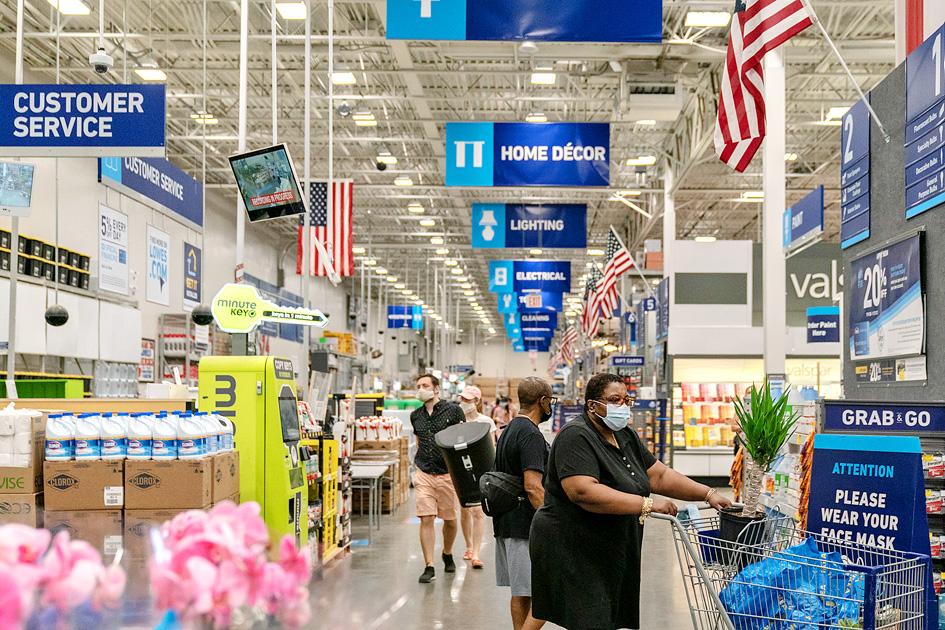Many retailers have been caught off-guard by COVID-19 restrictions and shifting consumer habits, but do-it-yourself (DIY) stores are enjoying a boom as people spend money on their homes and gardens.
A report by consulting group McKinsey & Co found that faced with a prolonged period of financial uncertainty due to the COVID-19 pandemic, consumers “intend to continue shifting their spending largely to essentials ... and cutting back on most discretionary categories.”
Consumers worldwide are cutting back on clothing and shoes, but spending more to improve their homes, the report said.

Photo: Bloomberg
In the UK, the sector has helped consumer spending overall to rebound to a level higher than before the pandemic hit.
“Spending for home improvements continued to rise in August as sales volumes within household goods stores increased by 9.9 percent when compared with February,” the UK Office for National Statistics said.
This should not come as a surprise, as people are spending more time at home, and even when not under lockdown, many people are working from home or have fewer public activities to participate in, the report said.
A survey carried out in 20 countries by consulting firm Accenture Ltd found that over two-thirds of respondents expect most of their social activities to take place at their home or that of friends.
The unease that many people feel in public spaces might push a lasting shift toward people spending more time at home, Accenture said, calling it a “decade of the home.”
Many Germans have used the downtime during the COVID-19 lockdown to “repair, refurbish and decorate their homes,” the country’s BHB trade association for home improvement, building and gardening said in a report.
Sales in the sector rose by 15.6 percent year-on-year to nearly 12 billion euros (US$139.58 billion) over the first half of this year, boosted by many DIY stores and garden centers being allowed to stay open during virus lockdowns.
Paint and painting accessories proved most popular, with sales climbing by 37.6 percent, BHB said, adding that garden furniture also saw a 21 percent sales jump, it said.
DIY retailers have been reporting surging sales.
Lowe’s Co, a major DIY chain in the US, saw sales rise 34.2 percent in its second quarter that ended on July 31 — a period when restrictions were still in place in some US states.
“Sales were driven by a consumer focus on the home, core repair and maintenance activities, and wallet share shift away from other discretionary spending,” Lowe’s chief executive Marvin Ellison said when announcing the results.
Kingfisher PLC, which has several DIY and home furnishing chains in France, the UK and Ireland, said that after an initial dip, sales quickly recovered and are still rising.
“The COVID-19 crisis touched our sales in the first quarter, but we saw a strong rebound in the second, a trend which is continuing in the third quarter at all of our chains and in all segments,” Kingfisher chief executive Thierry Garnier said.
Consumers have shifted a lot of their buying to online stores, a trend that is helping ManoMano SAS, an online-only French DIY retailer.
“In February, we were at 50 million euros in sales volume and in April, we were at 200 million, so you see the acceleration,” ManoMano cofounder Christian Raisson said. “We’ll more than double the 620 million euros in sales we had last year.”

Nvidia Corp CEO Jensen Huang (黃仁勳) today announced that his company has selected "Beitou Shilin" in Taipei for its new Taiwan office, called Nvidia Constellation, putting an end to months of speculation. Industry sources have said that the tech giant has been eyeing the Beitou Shilin Science Park as the site of its new overseas headquarters, and speculated that the new headquarters would be built on two plots of land designated as "T17" and "T18," which span 3.89 hectares in the park. "I think it's time for us to reveal one of the largest products we've ever built," Huang said near the

China yesterday announced anti-dumping duties as high as 74.9 percent on imports of polyoxymethylene (POM) copolymers, a type of engineering plastic, from Taiwan, the US, the EU and Japan. The Chinese Ministry of Commerce’s findings conclude a probe launched in May last year, shortly after the US sharply increased tariffs on Chinese electric vehicles, computer chips and other imports. POM copolymers can partially replace metals such as copper and zinc, and have various applications, including in auto parts, electronics and medical equipment, the Chinese ministry has said. In January, it said initial investigations had determined that dumping was taking place, and implemented preliminary

Intel Corp yesterday reinforced its determination to strengthen its partnerships with Taiwan’s ecosystem partners including original-electronic-manufacturing (OEM) companies such as Hon Hai Precision Industry Co (鴻海精密) and chipmaker United Microelectronics Corp (UMC, 聯電). “Tonight marks a new beginning. We renew our new partnership with Taiwan ecosystem,” Intel new chief executive officer Tan Lip-bu (陳立武) said at a dinner with representatives from the company’s local partners, celebrating the 40th anniversary of the US chip giant’s presence in Taiwan. Tan took the reins at Intel six weeks ago aiming to reform the chipmaker and revive its past glory. This is the first time Tan

CUSTOMERS’ BURDEN: TSMC already has operations in the US and is a foundry, so any tariff increase would mostly affect US customers, not the company, the minister said Taiwanese manufacturers are “not afraid” of US tariffs, but are concerned about being affected more heavily than regional economic competitors Japan and South Korea, Minister of Economic Affairs J.W. Kuo (郭智輝) said. “Taiwan has many advantages that other countries do not have, the most notable of which is its semiconductor ecosystem,” Kuo said. The US “must rely on Taiwan” to boost its microchip manufacturing capacities, Kuo said in an interview ahead of his one-year anniversary in office tomorrow. Taiwan has submitted a position paper under Section 232 of the US Trade Expansion Act to explain the “complementary relationship” between Taiwan and the US